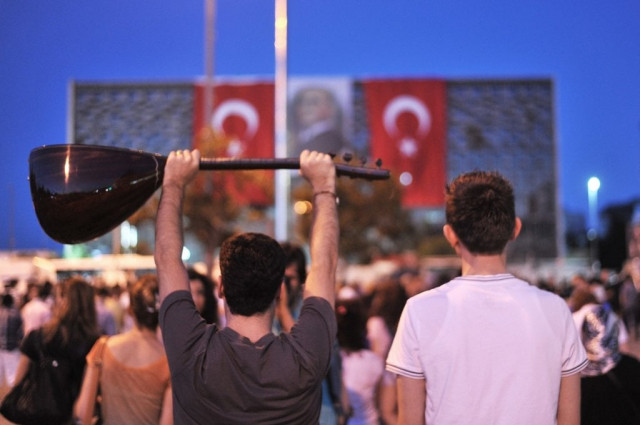Turkey 'in uncharted waters' after Gezi Park protests
The movement will continue in one way or another: Political scientist

Anti-government protesters gathered for the victims of the Gezi Park protests at Taksim Square in Istanbul on June 19, 2013. PHOTO: AFP
The demonstrators who have been standing silently still in Istanbul's Taksim Square in recent days are a far cry from the running battles that were fought between police and thousands of demonstrators at the same site just last week, when volleys of tear gas were answered with fireworks and rocks.
The demonstrators may have switched tactics, but that doesn't mean their anger has subsided against Prime Minister Recep Tayyip Erdogan, who stands accused of authoritarian tendencies and of forcing conservative reforms on the mainly Muslim but constitutionally secular country.
In fact, his heavy-handed crackdown on the protests, which culminated in the storming of Istanbul's occupied Gezi Park on Saturday, may only have hardened protesters' resistance to his government, experts say.
"The movement will continue in one way or another - it will transform into a kind of civil disobedience," said Cengiz Aktar, a political scientist from Bahcesehir University.
The "standing man" protests now sweeping the country are an example of just that. Launched by a choreographer in Taksim Square on Monday, the quiet act of defiance quickly went viral, spreading to a string of Turkish cities where protesters were searching for a way to make a stand without facing off against riot police and truck-mounted water cannons.
"Turkey is diving into troubled waters - at least uncharted ones," said Aktar, noting that Turkey's weak opposition parties failed to capitalise on the protest movement, leaving demonstrators without a strong political voice that could help bring about change.
Sociologist Nilufer Narli said it was "still too early" to predict what influence the protests will have on Turkish politics, but the demonstrators, mostly young, middle-class and well-educated, are unlikely to disappear into the shadows after presenting Erdogan with the biggest challenge yet of his decade-long rule.
"Their demands are still there, so is their political discontent, now even more strongly so," sociologist Nilufer Narli told AFP.
The crisis began when police responded brutally to a small campaign to save Gezi Park's 600 trees from being razed in a redevelopment project, sparking fury and spiralling into mass demos against Erdogan and his ruling Justice and Development party (AKP).
The protests were met with a heavy police response, leaving four people dead and more than 7,500 injured across the country, according to the Turkish Medical Association.
A polarised country
Observers say Erdogan inflamed tensions by dismissing the protesters as "looters" or naive youngsters who were being manipulated by "terrorists".
He also deepened divisions by holding rallies to fire up tens of thousands of AKP loyalists, telling them he would stand firm against the protesters and that he took orders only "from God".
"His language is beyond perception... It polarises Turkey. It pushes society to its edges," journalist Hasan Cemal wrote on Turkey's independent T24 website.
Erdogan has claimed victory after retaking Gezi Park, depriving demonstrators of their main rallying site, but the crisis could cost him dear politically, observers say.
Erdogan has won three succesive elections, gaining in popularity each time. At the last elections in 2011, his AKP took nearly half the vote and Erdogan routinely refers to his supporters as "the 50 percent".
But many protesters turned the table on the catchphrase, referring to themselves as "the other 50 percent".
"If Erdogan decides to polarise and further agitate people to sharpen divisions in order to consolidate his own troops, not only will his own future political career be put at risk but also the stability of the country," wrote Abdullah Bozkurt, the Ankara bureau chief of the Today's Zaman.
A poll published in the English-language paper on Monday found that the AKP would still come first if elections were held today, but only with 35.3 percent of the vote.
By resorting to force to deal with the protesters, the government "surrendered to fear and panic", Ahmet Insel wrote in the daily Radikal.
"Those who led the movement can't say that they've won - but everybody, starting with Erdogan, knows very well that they have."


















COMMENTS
Comments are moderated and generally will be posted if they are on-topic and not abusive.
For more information, please see our Comments FAQ